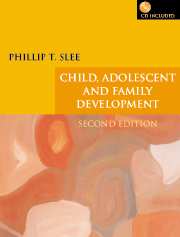Book contents
- Frontmatter
- Contents
- List of Trends and issues
- List of Family life-cycles
- List of Figures and Tables
- Note to the Student
- Note to the Instructor
- How to use the CD-ROM
- Acknowledgements
- Introduction
- Part 1 The Study of Human Development
- Part 2 Conception and Birth
- Part 3 Infancy
- Part 4 Toddlerhood
- Part 5 The Pre-school Years
- Part 6 Middle Childhood
- Part 7 Adolescence
- 18 Adolescent Physical Development and Health Issues
- 19 Cognitive Development in Adolescence
- 20 Social and Emotional Development in Adolescence
- Part 8 Studying Human Development
- Glossary
- References
- Index
- STUDENT FEEDBACK FORM
20 - Social and Emotional Development in Adolescence
from Part 7 - Adolescence
- Frontmatter
- Contents
- List of Trends and issues
- List of Family life-cycles
- List of Figures and Tables
- Note to the Student
- Note to the Instructor
- How to use the CD-ROM
- Acknowledgements
- Introduction
- Part 1 The Study of Human Development
- Part 2 Conception and Birth
- Part 3 Infancy
- Part 4 Toddlerhood
- Part 5 The Pre-school Years
- Part 6 Middle Childhood
- Part 7 Adolescence
- 18 Adolescent Physical Development and Health Issues
- 19 Cognitive Development in Adolescence
- 20 Social and Emotional Development in Adolescence
- Part 8 Studying Human Development
- Glossary
- References
- Index
- STUDENT FEEDBACK FORM
Summary
‘Two of the Fairest Stars’
Two of the fairest stars in all the heaven,
Having some business, do entreat her eyes
To twinkle in their spheres till they return.
The brightness of her cheek would shame those stars,
As daylight doth a lamp, her eyes in heaven
Would through the airy region stream so bright,
That birds would sing, and think it were not night.
See how she leans her cheek upon her hand.
O that I were a glove upon that hand,
That I might touch that cheek.
William Shakespeare, Romeo and Juliet, Act 2, Scene 2 Lines 15–23KEY TERMS AND CONCEPTS
Genital stage
Identity versus role confusion
Peer groups, cliques and crowds
Eros
Ludas
Storge
Introduction
A burgeoning body of research into adolescence, as reflected in a number of reviews of the field (Lerner & Galambos 1998; Galambos & Leadbeater 2000), has provided some insight into the world of the adolescence. In the Australian context the sentiment expressed by Collins (1991) that very little research has been conducted into adolescence largely still holds true and his call for more research into adolescence remains valid.
As we have seen in chapter 18, the physical changes occurring in this single phase of the life-cycle are quite dramatic, characterised by a sudden growth spurt, pimples, appearance of body hair and development of the reproductive organs. At the same time, adolescents acquire a greater capacity for rational and abstract thought associated with risk-taking, limit testing and experimentation. For some individuals, youth – particularly early youth – represents a time of increased self-consciousness and egocentrism.
- Type
- Chapter
- Information
- Child, Adolescent and Family Development , pp. 431 - 450Publisher: Cambridge University PressPrint publication year: 2002



